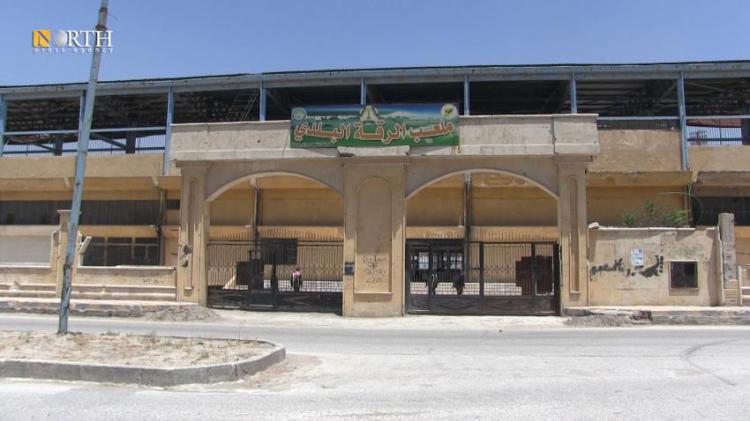Ahmad al-Hasan
RAQQA, Syria (North Press) – Professional and casual athletes in the city of Raqqa, northern Syria, criticize the lack of sport activities and the delay in completing the restoration of the city’s sports facilities, while those responsible for the projects say the delay is due to the allocated budget and preventative measures against coronavirus.
However, athletes’ hope for the return of sports to their city as it was before has not yet been fulfilled, despite the passing of nearly three years since the expulsion of the Islamic State (ISIS) from the city, in light of the constant rehabilitation and restoration of sports facilities.
Lack of sports activities
"Sports in Raqqa did not progress even after the liberation of the city, due to the lack of financial support for the players," said Khalil al-Sheikh, a former player in al-Shabab Club.
He said that there is no encouragement for amateurs and young athletes. "Unfortunately, sport in Raqqa has been out of place since 2013."
Saleh al-Daoud, a player in the Euphrates Club, described the reality of sport in the city of Raqqa as poor, because there is no financial support for the players, such as allocating salaries, so that a player can devote him or herself to sports and training.
He said that he visited the Youth and Sports Committee of Raqqa Civil Council several times to secure financial support, but to no avail.
Al-Daoud said that he and a group of donors set up a football stadium in the neighborhood of al-Mashlab, east of the city, at their own expense at a cost of 10 million Syrian pounds. "This stadium is equipped for amateurs in Raqqa to play."
Until now there is only one club in the city of Raqqa licensed by the Youth and Sports Committee, which is the Internal Security Forces (Asayish) Club. It includes a range of individual games and group games such as football and volleyball. This is in addition to the presence of unlicensed popular neighborhood clubs, according to the Youth and Sports Committee.
The Youth and Sports Committee's licensing requirements mandate that the club should have a team game, at least two individual games, and provide a headquarters, according to the Vice President of the Youth and Sports Committee Ahmed al-Sharif.
He added they are currently interested in reactivating sports facilities, but the issue of supporting players will be addressed in the next annual agenda, and that they will not be able to support players without the presence of ready sports facilities.
Unfinished restoration work
The Youth and Sports Committee works in cooperation with the Local Administration Committee and the municipalities of the Raqqa Civil Council to rehabilitate the sports village of Raqqa, which includes the local football stadium that has a capacity of 15 thousand spectators, in addition to gardens, a swimming pool, a hotel, a basketball court, and a volleyball court.
Abdulkarim Abbas, the supervisor of the rehabilitation project in the Youth and Sports Committee, told North Press that the current rehabilitation and restoration process includes leveling the pitch ground, removing the rubble, and cleaning the gardens, in addition to rehabilitating the swimming pool and the restaurant in the sports village.
He discussed the opening of the swimming pool soon after the reconstruction of the destroyed parts, covering its walls with ceramic and repairing water pumps needed to work, since the beginning of the resumption of the rehabilitation process this year.
He added that the maintenance and rehabilitation work that started in 2017 is still ongoing, but gradually, according to budget restrictions.
He attributed the reason for the delay in completing the work of renovating sports facilities this year to the preventative measures against coronavirus, as the rehabilitation work stopped during the lockdown and was resumed in early June.
The Black Stadium
The sports village in Raqqa was destroyed during the battles that took place between the Syrian Democratic Forces led-by the Global Coalition and ISIS militants in 2017.
ISIS had turned most of the sports facilities in the city of Raqqa into prisons and headquarters, such as the local stadium. It was known by locals as the Black Stadium, as it was the largest ISIS detention center in Raqqa during its control, which was known as Point 11. It was considered one of the most terrifying security headquarters at the time, which included several prisons and torture centers, according to local athletes and residents.
Abbas said, "During ISIS control over Raqqa, the sports village turned into a large detention center; it witnessed several field executions, and many of Raqqa’s youths were buried in the pitch ground.”
In 2014, ISIS prevented the formation of sports teams, and executed players from al-Shabab Club.
In 2017, the works of demining, exhumation of bodies, removal of debris from the pitch, restoration of terraces, and removal of shrapnel from the track began.
About 553 bodies were exhumed from the pitch ground in 2018, belonging to men, women, and children, according to the Initial Response Team of Raqqa.

